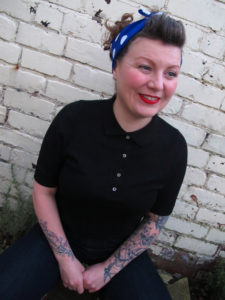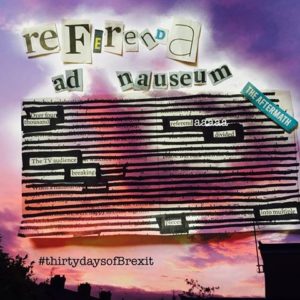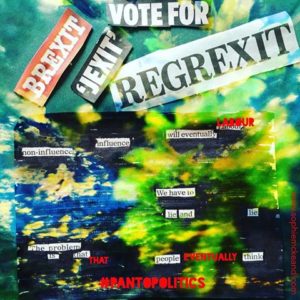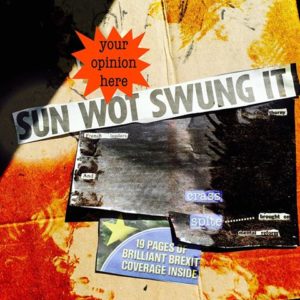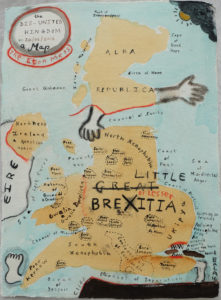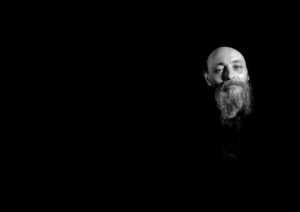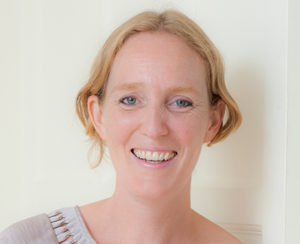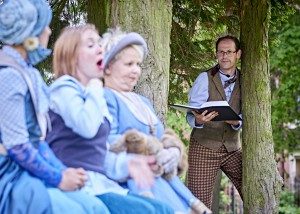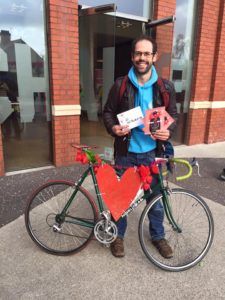
Interested in theatre, dance, visual art, gigs, poetry, film and more?
Want to access a free workshop which will give you an insight into the role of a critic?
Then, this is for you! The workshop and performance will be BSL supported. It will be suitable for D/deaf participants.
All participants will be able to:
-Access the workshop for free and see a performance of The Tempest by Taking Flight Theatre Company
-Be supported by Get the Chance to continue to review a range of events and performances.
The Tempest
“Join the Magic Staff Liner Corporation and indulge yourself with a jaunt on the newest addition to their fleet- their number one luxury ocean liner, The Remembrance. Let their crew take care of your every worry, your every woe on their 10 year anniversary cruise to the Island that Time Forgot.
Expect lots of laughs, physical comedy and live original music, but most of all expect the unexpected.
This performance has live integrated BSL interpretation and audio description.”
What’s involved?
You will take part in a 90 minute workshop with Guy O’Donnell Director of social enterprise and online magazine website Get the Chance getthechance.wales
During the workshop you will be given an insight into the role of the arts critic. You will be given instruction on how to create a review and upload your response online. Participants will look at blogging, video, social media and much more! All workshop participants will get the opportunity for their reviews to feature on the Get the Chance website.
If you have one please bring a laptop, tablet and/or smartphone.
The workshop is limited to 10 places. All participants will be expected to write a response to the performance.
Suitable for ages 14+
The workshop is on July the 11th at Cyfarthfa Museum from 5-6.30pm
Schedule
5-6.30 pm – Workshop
6.30-7pm -break
7pm -Performance of The Tempest
To book a place please email
getthechance1@gmail.com
Tag Archives: Taking Flight
Review ‘Real Human Being’ Taking Flight Theatre by Tanica Psalmist
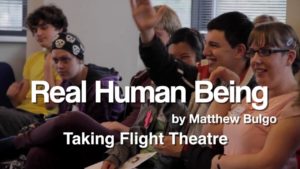
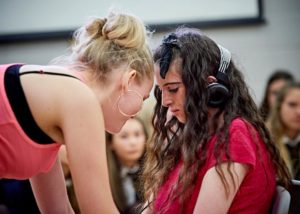
Forum Theatre techniques were used to educate the public.
Aimed to reinforce the knowledge of right and wrong; with a simple ’Stop’ ‘Rewind’ and ‘Go’.
Any one could participate or insinuate to play a specific role,
It took us further into a deeper dimension where we discussed ideas and social dynamical views,
A story about Prejudiced behaviour, insecurities and discrimination.
The actress with a significant role, imposed mental frustration, as we watched the victim in distress.
Hot seating, thought tracking was pursued, giving us all a wider concept, to analyse each actor internally undressed.
Psychologies lead to different people wanting to get involved. It was an interesting play, dominating problems in school.
This theatre piece was wonderfully devised, integration of those in the disabled community, wilfully were involved.
Based of real life issues, real-life experiences from pupils, was printed in to the script,
This made it twice as effective, especially with young pupils words incorporated
To ensure the script was deeply sincere and powerful words were resonated.
Energy from the actors, was so strong they made you feel how they felt,
The production ‘Real Human Being’ was generally a nail biting, eyes watering, uplifting play,
Especially when insecure, venerable Alice found a friend, who helped her mental state
I’ll happily fund, to have it run again to ensure, a certain aspect, effects someone, the same way.
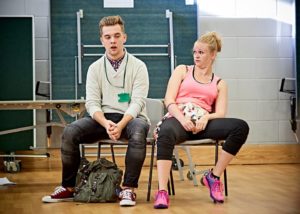
http://www.takingflighttheatre.co.uk
“Which is why I am writing this” Creatives and critics on the EU referendum
I have been shocked and dismayed by Thursday’s vote in which just over half of the British public expressed their desire to leave the EU. As a theater maker working with marginalised groups, much of the funding of organisations we come into contact with- organisations, which support the most marginalised and disenfranchised among us-, comes from EU pots.
The aim of Taking a Flight is to provide employment opportunities for Deaf, disabled and sensory impaired performers. Whilst I don’t anticipate that the government of the day would reverse laws and Acts which have already been passed to protect the rights of disabled people, I fear that, with the UK’s poor track record for supporting disabled people and protecting funding and support, that the UK will begin to lag behind Europe in this- and many other areas. This will happen.
My immediate response of panic has been much more personal, as I feel already there has been a paradigm shift in the attitude of many people towards “the other”-I have heard in the street, on social media and on the news, Joe Public using the result of this referendum as an excuse to be overtly, unashamedly and publicly racist. It feels as if this referendum has opened the door for the metaphorical tattooing of the bulldog on the forehead and the waving of the Union Jack in the faces of those who remain supporters of membership of the EU- and those perceived as “other”.
Lastly, I am disappointed at the number of people who appear to have voted “leave” in error- who decided to vote against the government – a protest vote which has cost us- and our children- dearly.
I wish I could share the “lets make the best of it” attitude- that the best art is inspired by diversity, but I’m afraid that with so many of my friends of European origin already planning to leave, and so many friends speaking of “winding up” all their EU contracts, with the pound at an 31 year low and the threat of further knocks to the industry I love and make my living- such as if us- at, I cannot bring myself to optimism at this point.
James Doyle-Roberts (Co-Artistic Director, Citrus Arts based in Pontypridd)
On the day of the result I was in a cheap hotel room next to London City Airport. The social housing estate next door is soon to be demolished to make way for yet more tiny 1-bedroom flats which claim to be “luxury” (as they always do), and will temporarily house workers rather than families, until they can’t afford to live there anymore.
This is how economic “growth” works, and is why I’m on the side of the social benefits that the EU delivers in our communities in Wales where it invests in apprenticeships, tourism and communities, so they can keep their shared spaces connected to their sense of self. And yes, that includes people who come from abroad who want to contribute to those communities.
At 6 am that morning, I woke up with the referendum result already in my mind. I checked my phone, and my heart sank into an empty-feeling stomach.
I’d already voted to Remain without a moment of doubt; I still respect some friends who have sound ideological reasons to distrust the EU’s current state, but don’t think their global revolution is coming soon and know a better bet on our current future when I see one.
The last thing I saw on TV the night before was the early Sunderland result declared alongside footage of cheering Leave supporters. This clip was different to the usual election results being declared to a band of victorious party-faithful, this was the kind of cheer we’d all seen in earlier weeks of the violence that accompanied the opening games of Euro 2016, it was cheering with anger and a F**k You attitude– the worst kind of victory cry.
I went downstairs to the breakfast room to see a man in his 50’s cheering loudly every time Johnson or Farage appeared on the TV above the heads of an international mix of fellow guests and staff. He’d clearly been having his own all-night Brexit party, surrounded by empty bottles and was enjoying himself by loudly addressing the staff (mostly non-white), in that particular smirking, dismissive, ‘you-know-what-I-mean’ way that the odious Farage has normalised into our political discourse in the past eight years.
I was being paid a small amount of money to attend Greenwich & Docklands International Festival (GDIF) and the networking events around it. Alongside my thoughts asking “what’s the point of going, now we have the repercussions of this terrible result to deal with?” I was also thinking “and so, here it begins . . .”, as I left Bully-Boy to his ugly antics.
The lump in my throat grew each time I thought of the future of my little boy, 19 months old, growing up in a society where facts and expertise become disposable when pitted against volume and vitriol. What kind of society are we allowing our media to shape where honesty and propriety are represented as just “one side of the argument”?
At the GDIF Marketplace event (where artists can meet programmers from around the world to sell our shows), the atmosphere was how I imagine a wedding party to be where the Bride or Groom have bolted, but the guests decide to stay to consume the food & drink anyway because it’s all been paid for. There was no banquet on offer, just opportunities to build relationships with fellow artists around Europe and the wider world, and chances for us to make the best of the funds we could collectively gather between us if we cooperate.
Speakers welled-up & choked as they tried to contextualise why we were all there. Scottish delegates had confidence that they would go their own way, anyway; I felt like apologising for Wales’ strong vote to leave the EU.
There is still hope for a way out of what looks like an ugly future, but without any current leaders with the integrity to step-up & confront the lies, it is up to us to build it together by talking to each other, our neighbours, the people we randomly meet, and not being afraid of Bully-Boy and his gang.
Rachel Tresize Author and Playwright
I’m absolutely devastated by the referendum results, not least here in my own Rhondda Valley where residents have benefited from so much EU funding in the past. I studied on an Erasmus scheme when I was twenty years old. It was such an inspiring experience to meet and study with so many students from all over the world and inimitable in introducing me to the world outside of my own area. As a writer I travel frequently to EU countries and am translated in Danish, Italian, Croatian and soon Slovenian and I would like young Welsh students and authors to have these same opportunities. I’m worried now that these ties will be severed due to financial and travel restrictions.
Gemma Louise Treharne-Foose Get the Chance Critic
I’ve been a lucky recipient of EU-funded programmes over the years. I had a paid for apprenticeship after University to train as a researcher in TV production because I lived in the valleys. I have been happy to take advantage of the programmes and funding available to me because of my postcode and because people think I need a ‘leg up’ or a head start. But these programmes and funding pools are a sticking plaster for the real problems going on in the valleys. Long term unemployment, dreadful infrastructure and crumbling services. I’ve had lots of conversations with others living here that it’s ridiculous that in 2015/2016 we are still relying on charity handouts – whether they are from Westminster, Cardiff Bay or Brussels.
I think the remain campaign never really addressed this malaise and the deeper frustrations and resentment, unfortunately. I fear for how much worse things will be here now. EU-funded projects were the only thing helping people back to work in many areas in RCT as UK-Govt services (like Job centres) have ceased or been closed down. As much as I agree with the reasons to remain, I have struggled to articulate to friends and colleagues from wealthier and more prosperous communities why people here aren’t jumping up and down and doffing their cap because of handouts from the EU. I think there’ll be some harsher realities coming our way, though.
Sophie McKeand Welsh Poet Young People’s Laureate Wales 2016-2018
I’ve chosen to respond to the Brexit debacle by creating blackout/cutup poems every day for thirty days using only that day’s papers using the hashtag #thirtydaysofBrexit. These are protest poems in response to the right-wing media bias we’ve all been subjected to.
This needs challenging, questioning and changing dramatically. Our media is homogenised and overtly right-wing which is why Jeremy Corbyn is getting such a roasting.
I personally believe he is, hated by the political and media establishment, the underdog the British public will get behind in the future. We’re sick of cock-swinging politics and many like his quiet socialism, his let’s-have-tea-with-your-nan approach. I think he is someone who could reach out to Plaid Cymru, the SNP and Northern Ireland, creating a united group of countries.
https://www.instagram.com/sophie_mckeand/
Iwan Bala Visual Artist
Keith Murrell Community Artist
I should preface my response by saying that I didn’t vote
I’m not registered at the moment because I have no permanent address – I know there is still an option to register but I don’t feel like sharing my personal circumstances with the bureaucracy. Having said that: I’ve never been overly engaged with the ‘democratic process’ and have very little (none) faith in the political party system – I’ve only voted a couple of times in my life and that was about issues rather ideologies … at the previous general election I voted ‘Green’ not because I thought they could win but in order to show support and help them to keep their deposit. Had I been registered this time around I would have voted to remain: this in itself is more of an instinctive reaction to the politics of those who want to leave, rather than any shining virtues of the EU.
I personally have little regard for ‘national identity’, borders, or flags and I tend to think more in terms of community and the planet. In that respect, I’d find it more plausible to think of myself as a citizen of an actual place (i.e. Europe) than being a subject in some archaic theme park called GB, UK or whatever it might say on the vellum.
In practical terms: I think the EU is of great value with regards to the advancement of things such as Human Rights, Employment Law and Environmental issues, etc. On the other hand, I’m not particularly enamoured about the impact of European funding for ‘socially targeted’ projects. Having worked on several such projects with a total value of several £millions I witnessed most of that money being directed towards vested interests more than improving the communities intended… and at worst Euro funding has been used to disrupt, dis-empower and displace communities… Butetown has had more than £1billion of EU money and where is it now?
Outside of Cardiff – the areas of Wales which receive the most EU funding voted to leave and irrespective of the politics behind the individual votes this must be seen as indictment of the public and voluntary sector in the delivering the EU programme.
With regards to the political campaigns the apparent choice was between buffoons and liars (clowns to left, jokers to the right …) I didn’t hear anything convincing from either side but then again I wasn’t paying much attention.
Regardless, I reckon the high turnout was due to the media hyperbole rather than any actual knowledge of or even interest in the EU … it’s quite bizarre to think that people might be more concerned about the goings on in Brussels than their own Town Hall.
In the event, I was a little surprised – and disappointed – with the result: mainly because it demonstrates the prevalence of such retrogressive attitudes – and might encourage / permit more people to think more along these lines. Then again, it seems that there was a generational factor in the voting with the implication that the younger people think differently and in time they will lead the debate – if losing this referendum mobilise young people then that will be a good thing …
But my Facebook timeline was inundated with angry / fearful posts about the future without the EU – and my response was “it’s actually not that bad” …
The media, pundits, etc have great fondness for using terms like ‘historic’, ‘pivotal’ and ‘once in a lifetime’ because it makes their role in the affair all the more important – every major political, sporting or scientific event is presented this way – and the public buys it because it makes their lives seem less mundane – but in reality nobody is interested in history but historians: you couldn’t go into into your local pub or corner shop and hear about the economic impact of the Versaille Treaty – very few people in Wales were preoccupied with Wales’ history in the European Championships until the TV reminded us and if Wales should actually win it will pale into insignificance in little more than a decade
I don’t claim to know anything about macro-economics (which makes me better informed than most) but I do know that the actual economy has very little to do with elections (although I will also say that every penny earned and spent is a vote cast)
I personally don’t have any property, investments or pension to speak of and I have quite a low maintenance lifestyle – so market shifts mean little to me – but for those that have those concerns I would say that ‘there is many a slip between cup and lip’ so there will always be the potential that they could lose out but similarly there’s about as much chance that the pendulum will swing and at some point they may be ahead – and this has been the case from the Bible to Barings Bank
I don’t have a passport and have never travelled outside of Wales & England – so again the whole notion of passports, visas, etc has little impact on me directly – but I don’t know that I would be too bothered about filling in some forms if I wanted to visit somewhere that badly – and perhaps people should travel around Wales a bit more 🙂
Dr Emily Garside
I am sad, I am angry, I am disappointed. Above all I am frustrated. Frustrated with the politicians who led us to here, with the media who helped further campaigns fought on little or misinformation. And I’m frustrated with those who say because it was a ‘democratic’ vote we must all sit back and quietly accept the decision. I accept that the vote was democratic, I accept people’s right to vote Leave. I don’t have to be happy about it. Thatcher was elected democratically and I’m still angry with that, and the implications of what she did while in office. And much like what Thatcher’s government did to this country, to the poorest areas and to the arts, I fear that the decision to leave Europe will be felt for generations to come. And much like in Thatcher’s reign, Wales is a place where the hits will be felt hardest.
In Wales you really don’t have to look far to see one of those little signs with the European flag that let you know the building that was repaired, the social space rebuilt or the arts centre allowed to continue is still there because of European funding. So much of Wales has been rebuilt in literal and cultural terms by the EU, and that so many areas, so many voters let xenophobic notions and unfounded immigration fears blind them to that scares me.
I fear for our artists and our art. I fear for the millions in lost funding that the arts in all their forms are reliant on. Wales has always been outward facing in it’s art. We invite the world to share our stages for Eisteddfod every year. We hold festivals that people travel to from the world over. And we collaborate, we share, we create. It’s in our very nature as a nation of artists. And it is this loss of collaboration I fear most. When paperwork halts free movement, when isolationism means the hurdles are too great to overcome to collaborate and yes, when we no longer have access to the funding we do now, because we cut ourselves off.
It seems reductive, gauche even to reduce my fears about arts in Wales to funding and travel, but these are the vital tools that give our arts life. In cutting off the vital lifeline of European funding, and building barriers to ease of travel to share what work we can still create, what then? I think of all the work unmade, the opportunities not shared, and it breaks my heart.
The ‘leave’ campaign seems to be fought and now won on a backward looking attitude, a yearning for a country that in fact never was. If we look at Wales before EU funding we were crumbling, our arts were suffering. There are no ‘good old days’ to go back to. What an open Europe has done is open the doors to collaboration, to inspiration and to forward thinking, forward motion. To quote Tony Kushner ‘The world only spins forward’, and yet we seem to have voted to try and stop.
What now? That’s the question isn’t it. When you (democratically) vote in a government you know roughly what’s coming, for better or worse. You know policies, personalities and in four years you have the hope that they’ll be gone. Europe is a leap in the dark. The fear is real because the answer to the question of ‘what now?’ is ‘nobody knows’.
The most anger I feel is towards those who tell us all to ‘just calm down’ as if this was a bad football score (not that I hope to jinx Wales’ chances, football is about the only ray of hope I can see right now, and I don’t even like the sport!). But maybe there’s hope in that. In the anger. If there’s one thing the arts does well it’s respond to crisis. And that is where I do have hope. I have hope in the voices of the artists, and will of the arts companies to keep fighting. To keep working however we can.
Yvonne Murphy Omidaze Productions
The referendum result is not binding. It is advisory. Parliament is not bound to commit itself in that same direction. I do not believe the referendum was managed in a fair and democratic way and since the Leave campaign spoke so highly of sovereignty I wish British Parliament to enact it’s sovereign right in overruling the referendum result in the best interests of Britain and ALL its people and its future generations.
And so I have launched a petition. Here is the wording:
Sovereign British Parliament to debate EU referendum result & vote to overrule.
The British Parliament is sovereign and it is accountable to the people through elections at which we choose those whom we want to represent us, NOT through referendums. MPs are our representatives & are there to decide what, in their judgement, is good for us and the country.
Many Leave voters placed a vote of protest against a range of things not connected to the EU, from austerity cuts, to rising inequality in Britain without actually understanding the facts or the full implication of their vote. This is why we elect MPs in our democratic country to make these decisions. e.g capital punishment was thankfully abolished in the 60’s although a clear majority of the population remained in favour of it. The nearly 50% of the population who voted remain need a hearing.
It takes a few days for a petition to parliament to be processed and approved. So while I wait for that to happen I have written this article/blog. The petition circulating and gathering millions of votes asking for a second referendum (which I signed) was started in May by a Leave campaigner worried that we would get a Remain result! I do not particularly want a second referendum. I want parliament to deal with this. I didn’t want a referendum in the first place. Nor did at least half the country. So why did we have one?
We had a referendum because David Cameron took a high risk strategy with our country’s future to appease the right wing bullies in his party, to silence UKIP and stop the migration of Tory MPs to that party. He took that risk because he did not for one moment think the country would vote out. Even the man who ran against him (Boris) did not for one moment think we should leave (which is why he is now furiously back peddling) he simply wanted to ‘play the game’ and raise his profile so he could go for leadership next time round. The Co-leader of the Leave campaign Iain Duncan-Smith in a interview on Friday called the result ‘startling’ not once but twice and appeared to be thinking on the hoof of the next steps ‘well I think what we need to do is get together a group of cross party MPs…and maybe some people from outside…some Lawyers…to work out how to progress….’ No way? Great plan. And so the people of Britain were used as pawns in the games of these rich privileged elite Eton boys to further their own careers.
What they had not understood is how angry the British people are. The divide between the rich and the poor and inequality has grown out of all proportion. We are one of the richest countries in the world and yet food banks have become the accepted norm in every town in Britain. When I told colleagues this on a recent trip to India they thought I was joking. They stood dumbfounded that such poverty existed in the UK. And it does. There are parents going without food in order that their children can eat. Today. In modern Britain. It is a disgrace.
And this is why people voted. They simply could not see or understand how it could get any worse. Because they were lied to by the Leave campaign. They were told if we left the UK millions of pounds would suddenly appear in the coffers of the NHS. They were told immigration was the cause of all their woes and the door would be shut. And this was the worst part. This emphasis and blame on immigrants which has opened the door to far right facism, racism and hatred on our streets and in our communities.
And worse still it has opened the door across Europe to Far Right Extremism with the National Front in France calling for France to follow suit and leave the very institution that was formed post World War II to ensure Facism never again gripped Europe and the world.
Shame on you Boris, Gove and particularly Farage. Shame on all of you for dividing our country. For peddling fear and hatred and intolerance. For picking at a scab until it bled. And shame on you for your lies.
Those who voted Leave were told we would get our country back. From whom? From our fellow countrymen? From the EU citizens who lived here, raise their families, contribute to our society, pay our taxes? Our country is now falling apart before our very eyes. They were told it would be an end to EU regulations. Like the ones which mean our children no longer swim in filthy polluted seas as I did as a child? Or the ones that ensure that workers have to be paid a fair wage and have decent working conditions? Or the one that gave us the Human Rights Act? Or the ones that say that the poorer more deprived areas in the EU (the very ones that voted Leave) must have the lions share of funding? Because they have. I remember Wales in 1992 when I first came here. It is a different country now and that is mainly due to being cited a ‘poor country within the EU’ and receiving a shed load of EU investment.
People in this country are not struggling because we are in the EU. They are struggling because we do not share equally the wealth we have at our disposal and the EU is a mechanism which actually helps share that wealth not hinders it. Without EU membership we will be MUCH MUCH worse off. Economically, culturally and spiritually. Many people voted Leave because they felt things couldn’t get any worse and then voted for the very thing that will absolutely ensure that it does.
“For many millions of people, this was not just a vote about Europe. It was a howl of anger at politicians and institutions who they felt they were out of touch and had let them down…The British people deserve the chance not to be stuck with the appalling consequences of a Leave campaign that stoked that anger with the lies of Farage, Johnson and Gove.” Mr Farron Lib Dems A spokesperson for the Liberal Democrats said people would feel “betrayed” with the outcome of Brexit and suggested the result had been won on a false prospectus.
And so in the words of the Independent
“All that remains is for someone to have the guts to stand up and say that Brexit is unachievable in reality without an enormous amount of pain and destruction, that cannot be borne. And David Cameron has put the onus of making that statement on the heads of the people who led the Brexit campaign.”
Which is why I am starting the petition.
Which is why I am writing this.
Which is why I cannot quite believe that Labour – at a time when they should be stepping up and holding every Tory MP (on both sides of the campaign) to account who have brought this mess upon us are instead too busy have a row about leadership (again!!!) and allowing the Torys to rewrite history and yet another false narrative. Park your differences for a few months, unite and serve your country and not your own self-interests and do your job which is to OPPOSE not self-combust at a time when we need an opposition most.
And for my colleague who said
“My only question is what would happen with MPs who want to Remain who represent Leave areas? They’d never get re-elected…”
I say well that is a risk all MPs should be prepared to take. They are there to work in our best interests and not their own and sometimes that means taking the very difficult and unusual decision to NOT do what those who have elected them ask them to do. Because they are our representatives. They have the facts. They have the education. They have the time to read the policy documents which we do not. That is their job. And they must now debate in parliament if the result of this referendum is actually in our country’s best interest. And if the majority truly believe it is not then they must overrule it and face the consequences. That is leadership. Leadership is not easy. That is why they are paid the salaries they are paid. And now they must ALL step up and look into their souls and decide.
Barbara Michaels 3rd Act Critic
Brexit and the Arts in Wales
Now that the initial furore and panic is over, what is the future for the arts on Wales? As with in other parts of the United Kingdom, we have to wait and see. What is certain, however, is that for a time (and who knows how long that time will last?) everything will be in a state of flux.
Disturbingly, when budgets and funding are up for consideration – some might call it up for grabs – the arts are always in the firing line. In Wales, when the arts scene – and I refer particularly to theatre – is expanding as never before, to cut funding at this stage would be close to criminal. This does not apply only to our capital city, where we are spoilt for choice, but to rural areas – take the prestigious Theatre Clywd, for instance. New talent in both writing and performance are emerging all the time, and being given the chance to explore all manner of genres.
My fervent hope is that our government realise this and will continue to give them support. Many of our young people are dismayed by the result of the referendum. It is up to the powers that be to prove to them, and to all of us, that there is indeed Life After Brexit.
Helen Joy 3rd Act Critic

An open conversation on Facebook between people who all know me but who don’t necessarily know each other, held in the week of the EU Referendum result.
Each contributor is represented by a different colour text.
Time for something slightly different: how do you think the vote to leave the EU will affect Arts and Art funding?
The arts economy is marginal at the best of times. I can’t see this having an exaggerated effect on funding. A great deal of Arts Council funding comes from the lottery rather than government revenues.
Some 2yr + bids being wound up where applying for EU funding. Not arts bids.
It’s the cutting of cultural ties I worry about, the Little Britain mentality and the feeling that we can go it alone. I’ve always liked feeling European.
We are used now to a sense of continental culture, the arts seem to benefit from both being carriers of local identity AND being representative of something wider.
If a cultural tie depends on the blessing of a bureaucrat, or still worse funding from one, what is it worth? The ‘cultural economy’ as a whole is huge; it was revealed a few years ago that this country earns more from computer game design than from agriculture. However, it had never asked for or received a penny of government funding, so nobody noticed.’ Culture’ is what people do of their own volition. Start steering it with subsidy, and it becomes something else. That’s how we get the grotesque spectacle of state-funded ‘satirists’ on the BBC.
Sure, to quote Raymond Williams, ‘culture is ordinary’. However, the BBC isn’t the State, that’s a line peddled by James Murdoch.
It’s no longer disputed that the licence fee is a tax (one I don’t pay); the BBC’s establishmentarian bias on many topics is now beyond satire, not least on the referendum issue. It’s notable that two of the best cultural institutions in London, Shakespeare’s Globe and the Handel Festival, don’t ask for or receive state funding.
Maybe I just like the way the BBC presents the bias. In a world completely reliant on private funding or ‘sponsorship’ we’d have a lot less culture and most of it would have to satisfy the paymasters. I’d rather satisfy the Arts Council’s remit than try to please Monsanto.
Culture always has to satisfy the paymasters. I’d prefer those paymasters to be you, me and the people around us! Would you say that our film industry was more dynamic and creative than America’s? Most of the TV I watch now is American-made.
Wouldn’t argue with your first point about culture and who pays for it but if I had to rely on things I could sell I’d be doing something very different. I don’t have anything sensible to say about film and TV. I could happily live without it.
Have they actually had any, or is this part of the current campaign to whistle up hysteria? I’m currently dealing with people on my local FB page, putting up pictures of people they accuse of racist remarks, without any evidence to back it up.
We need to build new structures we need to encourage philanthropy we need to not be scared of making money
Did you know that artists, writers, musicians here (Ireland) pay NO tax? Legacy from Charlie Haughey.
Who decides whether what they do is ‘art’ ?
No idea, presume Arts Council.
I think it’s older than Haughey’s time ; John Huston moved his family to Ireland back in the 60’s, I believe. So the bureaucrats sit in judgment on the artists, who have to meet their criteria? H’m. Curious how there always seem to be salaried posts for arts bureaucrats, but not for artists. A friend once showed me the telephone extension list at the UK Arts Council: more names than the Menin Gate. You’d get more money to artists by summoning them all to Trafalgar Square on a given day and dropping the annual budget in pound coins out of a helicopter.
So not even arts bureaucrats, but the Revenue Commissioners, are the judge of the artistic merit of your work:
http://www.citizensinformation.ie/…/artists_exemption… Artist’s exemption from income tax. Some income earned by artists, writers, sculptors and painters in Ireland from the sale of their work may be exempt from income tax. How to obtain exemption from income tax if you are an artist and satisfy certain criteria…
No was Haughey who introduced it.
Or just work to a different model – fund public art but let the market decide on everything else, like an accountant or pianist. Arts Council England – radio 4 now – believe arts will solve problems on our streets
Hearing this, a vision comes to me of a fat abbot, standing outside the glorious choir of some great abbey, saying ‘Without us, who would feed gruel to the poor?’
That’s interesting, not such a surprise I suppose. I’d like to know more.
Interview Alastair Sill A personal introduction to Audio Description for Theatre
Our project coordinator recently spoke to Alastair Sill who provides Audio Description for a range of theatre companies in Wales.
Hi Alastair, can you tell me how you got involved in your area in the arts?
After finishing my degree in English, I wasn’t really sure what I wanted to do but I knew I wanted to be involved in drama. I started writing to a few theatres across the country and the Belgrade Theatre in Coventry was one of the theatres I contacted. It just so happened they were looking for a marketing assistant to train up, so I went along and was lucky enough to get the role. I was a general marketing assistant so distributing posters, general office support etc, which was fine. Whilst there I was chatting to a colleague about other roles available in the theatre. She mentioned that she was involved in Audio Description and would I like to come and have a listen to it and see what I thought? I said yes and went along. At the time Audio Description was a voluntary service so there would have been about 6 audience members who were interested, this must have been about 15 years ago, things have changed since then. After meeting everyone I was keen to get involved, in-house training was provided by a member of the Audio Description Association. I enjoyed the training but was really interested in acting and applied and managed to get a place on the drama degree at the Royal Welsh College of Music and Drama in Cardiff and completed this course in 2003.
After qualifying I saw an advert for a training course in Audio Description at the Soho Theatre in London. Which I applied for and got accepted. The final exam was to AD a Christmas show at the Soho Theatre, which was the Big Bad Book by Lauren Child, which as you can imagine was very nerve wracking. The production was brilliant with lots of animation and live performance. It was difficult to capture in AD the style of the animation in the show but it went well and I passed the course. I continued to develop my acting career but the AD started to drip-feed into my work, mainly through friends based in Cardiff. who had their own theatre companies. I think one of the first productions I provided AD for in Cardiff did was at The Sherman Theatre called The Minotaur in Me by Paul Whittaker. The Sherman then asked if I could do the Christmas shows and then a few more shows a Sherman.
So how did you employment as an Audio Describer develop from there?
I then went to work at the Torch Theatre. Peter Doran the Artistic Director said they had accessed some additional funding to provide moreAD for their productions so I spent an autumn season there, which was really nice. I provided AD for a Christmas show and a play called Accidental Death of an Anarchist, by Dario Fo the play is a farce. That was a challenging piece for me to AD as it was difficult to keep up with the timings. When you are describing different types of theatre you have to change the AD to fit appropriately.
I wonder if you would mind explaining your actual process when you are asked to Audio Describe a production?
I spend quite a long time with the work; firstly I go and watch the play, with the audience. Then I come back again and read the script and often watch it from the audio description booth, which is the space I am usually in when providing AD for a production. I make notes on the script, pauses in the dialogue and perhaps the facial gestures of the cast. It’s important to note relationships between the characters and how lighting helps to tell the story. Then I come back again and watch it for a third time and will often have been given a video recording by the theatre or production company. This helps to really focus on what I need to be prioritising when providing AD. I can pause and rewind, which you can’t, do in real life! In total this process can take about 5 days to a week.
Could talk a little about your actual approach to live AD during a production?
OK so most importantly you cant talk over what’s happening on stage! This means you might create a sentence that you think describes perfectly what’s happening on but then when the actors are performing you might not be able to find the gap. This means you have to condense everything down to tell the story. This can be difficult as there are often lots of different things happening at the same time. You have to try and focus the AD down to the essential elements that convey what’s happening on stage and are most important for the audience.
There are moments when there might be a pause or a silence and the AD disrupting this can spoil this silence and the drama of the moment. Essentially AD is about choosing when to talk and not to talk! The AD audience and non-AD audience share the same space and the same moment in time, you have to feel what’s happening on stage. When it works, you feel connected to the world on stage; it’s a strange sensation as though you are on stage with actors.
Then there are also moments which frustrate me and I am not alive to the situation and I speak over what the actors are saying and that annoys me as I want it to be as good as it can be. Sometimes I get a bit carried away and get too descriptive. There is only so much information the audience can assimilate in their heads. It’s really important to get to know your audience.
So what companies in Wales have you been working with most recently?
I have worked with new writing company Dirty Protest on the play Parallel Lines written by Katherine Chandler and directed by Catherine Paskell. Catherine and the team were very helpful. Everyone was interested in the AD provision, I was aware it was a piece of new writing and felt a responsibility to describe it correctly. I spent quite a long time in rehearsals which was beneficial to the final AD for the production and also provided AD in a variety of venues when the show went on tour.
Alastair providing AD for Taking Flights production of A Winters Tale
I have also worked with Taking Fight Inclusive Theatre Company as a cast member and provided AD. Taking Flight often perform outside for their production of ‘A Winters Tale’ I played a character who was sort of the court audio describer and I was referenced during the play by the cast and was visible to the audience, which I am usually not. There were moments during the production when I would provide live AD with a microphone to an audience who are using headsets and then moments when I would speak directly to the entire audience That was really great to be able to integrate AD in this way.
I have recently just started to AD dance, for a production called Jem and Ella. I am developing my dance vocabulary and getting working on getting the emotional feeling across as much as the technical vocabulary. I had a lot of support from Jem Treays and his daughter Ella who are the performers in the piece. They helped me develop my vocabulary to AD the movement in the show, I found Rudolf Laban’s quality of descriptive movement helpful as well.
As you mentioned AD provision is becoming increasingly common, more creative use is being made of artists working in this field. What do you personally think the future might hold?
Well in Wales there are more companies and venues supporting the provision, which is great. Some venues really support AD well but I think it needs to start from the top down. Awareness of audiences need to start from that initial entrance to the venue and meeting the Front of House staff right through to the actual performance, inclusion should be the norm. Venues often don’t know when someone blind is attending so if possible they should aim to have an inclusive attitude for every show.
Personally I am interested in creating my work with AD at the heart. Also I am not aware of anyone that provides AD in the Welsh Language in Wales and wonder if that is something that could be supported in the future?
Next up I am providing AD for Theatr Fynnon for a production called Pupa, which will be performed at Chapter Arts Centre on Friday 20 May – Saturday 21 May. Then National Theatre Wales and a production called Before I Leave at the Sherman Theatre. I think the AD for that production is on Saturday the 11th of June at 2.30 pm. I am also working with Hijnx Theatre Company and their Unity Festival. And of course Taking Flight who are performing Romeo and Juliet this summer.
Many thanks for your time Alastair.
Alastair recently took part in a charity bike ride to raise funds for Taking Flights summer performance of Romeo and Juliet.
You can catch Alastair providing AD at the following performances below.
http://www.chapter.org/theatr-ffynnon-present-pupa
http://www.shermancymru.co.uk/performance/music/before-i-leave/
http://www.hijinx.org.uk/unity/
http://www.takingflighttheatre.co.uk/romeo-juliet/





